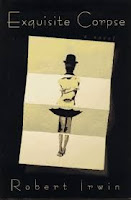The protagonist is a minor painter with a Buster Keaton profile who, in the course of a Dadaist prank, makes the acquaintance of a conventionally attractive young English typist. Our hero, Caspar, has a rather obscure (if not fictitious) background, littered with innuendos of an extraordinary youth under the wing of a mysterious guardian, and he seems to find young Caroline exotic in her ordinariness. The other members of Caspar’s surrealist group, the Serapion Brotherhood (an Irwinesque name if there ever was one, harkening back to E.T.A. Hoffmann and referencing a similarly named Russian writers fraternity of the 20’s), are enjoying an extended adolescence, playing games with irrationality as they play peek-a-boo with their individual insecurities within the context of their grand surrealist gestures.
As the movement unwinds in the shadow of the approaching
Nazi darkness, the Brotherhood scatters to the wind following a very short and
dismally conceived orgy. Caroline
herself has suddenly disappeared, and in his search for her, Caspar’s obsession
grows. With the world tilting on its
axis, he desperately seeks the “normalcy” of a quiet dull life as a painter of
railway posters and Caroline, to his mind, is the key to this state of
existence that he now desperately craves.
Robert Irwin is a talented author who blends historical
personages (Dali, Breton, Paul Eluard, and a special appearance by Aleister
Crowley) into the narrative quite effectively and with good humor. Caroline’s disappearance isn’t much of a
mystery for even a half-attentive reader, although a red herring early on
suggesting that Caspar has somehow caused her demise has, by novel’s end,
vanished without a trace. While Caspar
seems to bumble through the story like a little lamb lost (the Keaton reference
seems to be an apt one), his adventures, acquaintances and sensations are quite
enough to make this an enjoyable read.
Illustration: Exquisite Corpse (1928) by Man Ray, Joan Miro, Yves Tanguy, and Mas Morise


No comments:
Post a Comment